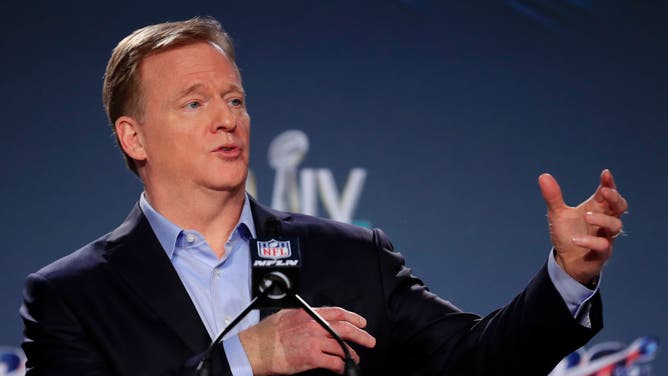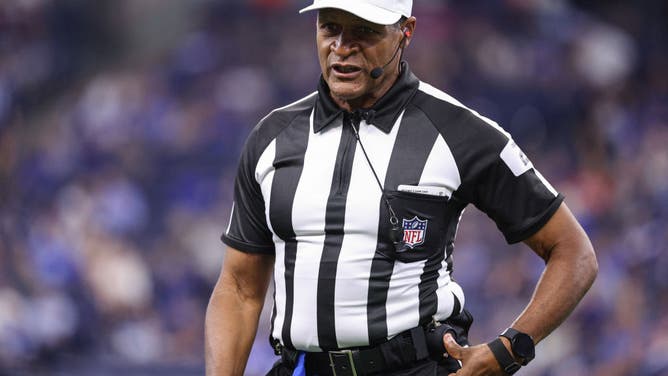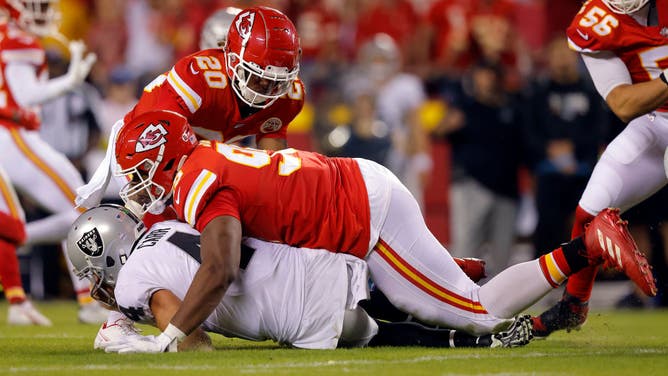Roughing The Passer Is Latest Well-Intentioned NFL Penalty Drawing Understandable Backlash
The NFL has been here before. It's seen games apparently decided on controversial calls interpreting controversial rules that few people -- including fans, players and some coaches -- fully understand or agree with. And it's seen the backlash threaten to turn attention away from the game and toward how terribly the game has changed.
That's where we are with the roughing-the-passer calls now. That's where we were with taunting penalties exactly one year ago.
And just as last year's issue was resolved as the officiating "self-corrected," per one league source, away from questionable applications of the taunting rule, the league is hopeful a similar correction is coming in the next couple of weeks on its roughing rule.

NFL Commissioner Roger Goodell in 2020 in Miami, Florida. (Photo by Cliff Hawkins/Getty Images)
The topic will be discussed at the NFL winter meeting Tuesday in New York. But don't expect any public directive to de-emphasize roughing-the-passer calls, The Associated Press reported.
Beyond emphasis or not, if the rule is to be changed outright it will be next spring. The league's competition committee must recommend a change or clubs must propose it to ownership for a three-fourth (24 owners) vote.
So in the meanwhile?
The NFL in Week 5 suffered through some notable calls that began with Jacoby Brissett's Academy Award nominated flop against the Los Angeles Chargers. Then it got worse.

NFL referee Jerome Boger on Aug. 20 in Indianapolis. (Photo by Michael Hickey/Getty Images)
Jerome Boger Call Aids Bucs, But Applied Equally
The Atlanta Falcons saw their improbable comeback hopes against the Tampa Bay Buccaneers snuffed out when Tom Brady got a controversial roughing call from referee Jerome Boger on a tackle by Grady Jarrett that seemed unremarkable by 1970s-2020 NFL action.
"What I had was the defender grabbed the quarterback while he was still in the pocket and unnecessarily throwing him to the ground," Boger said in a postgame pool report. "That is what I was making my decision based on."
So Boger is deciding what is necessary and unnecessary in his judgment.
But this must added somewhere because it has been ignored amid the controversy: Atlanta quarterback Marcus Marriota enjoyed equal protection on a similar apparent sack that turned into a Boger roughing call against Vita Vea in the second quarter.
So if these were bad calls, it was bad for both sides at different times.
Just When We Think Roughing The Passer Calls Hit Rock Bottom
The ugliest of all the roughing instances came on Monday Night Football when, in a signature moment of the NFL week's signature game, Chris Jones was flagged for roughing-the-passer on what looked to the entire Earth like a caused fumble and recovery against Las Vegas Raiders quarterback Derek Carr.
That call blew up the internet. And although officials in New York had zero to do with calling it or managing it after the flag, it got the league office's attention, per sources.
That's what happens when Hall of Fame quarterback Troy Aikman, calling the game on ESPN, says this on national television:
"My hope is the competition committee looks at this in the next set of meetings and, you know, we take the dresses off."
From a sheer football context this is a former quarterback who suffered multiple concussions during his career basically saying the NFL's current protection of quarterbacks is too soft. And he's not alone.
Coach Tony Dungy, you should know, is in the Pro Football Hall of Fame.
So this isn't a bunch of rough dudes sitting in a basement, swigging beer and yelling at their TV because they're upset at a random call. This is real.
And it's troubling because the rule is being interpreted inconsistently in some cases. Sometimes a quarterback being flung to the ground is roughing the passer. Sometimes it's merely a sack.
So now some NFL players aren't completely certain when their action is within the rules or likely to draw a penalty flag.
"Just looking back on it, I’m still kind of left clueless," Jarrett said on 680-The Fan in Atlanta this week. “on what I’m expected to do in that situation.
"When people watch us to be entertained, to see some game-winning drives, and then when you do it right, the right way, that’s what makes it so frustrating, because you did follow the rules and you didn’t do anything bad."
After the controversial call against the Chiefs, referee Carl Cheffers stood by his call because, he said, Jones landed on Carr with the full weight of his body after he grabbed the football from Carr.
"The quarterback is in the pocket, and he’s in a passing posture," Cheffers said in a pool report distributed after the game. "He gets full protection of all the aspects of what we give the quarterback in a passing posture. So, when he was tackled, my ruling was the defender landed on him with full body weight. The quarterback is protected from being tackled with full body weight. My ruling was roughing the passer for that reason."
The ruling makes zero room for when the ball is loose.
“No because he still gets passing protection until he can defend himself," Cheffers said. "So, with him being in a passing posture and actually attempting to make a pass, he’s going to get full protection until the time when he actually can protect himself. The fact that the ball came out and was subsequently recovered by the defense is not relevant as far as the protection the quarterback gets."

KANSAS CITY, MISSOURI - OCTOBER 10: Derek Carr #4 of the Las Vegas Raiders is sacked by Chris Jones #95 of the Kansas City Chiefs during the 2nd quarter of the game at Arrowhead Stadium on October 10, 2022 in Kansas City, Missouri. Jones was called for a penalty for roughing the passer. (Photo by David Eulitt/Getty Images)
Two Things On That Roughing The Passer:
Jones and other defenders are at times expected to suspend the law of gravity as they fall on quarterbacks to comply with the rule against roughing the passer.
Secondly, Cheffers and all officials are typically making a judgment call on these plays. And although they've been ordered by the league to "err on the side of caution" and protect quarterbacks, that doesn't mean everyone agrees with their judgment.
“How should I tackle people?" Jones said. "How should I not roll on him? I’m trying my best. I’m 325 pounds, OK? What do you want me to do? I’m going full speed trying to get the quarterback. They have put such an emphasis on roughing the passer penalties that we’ve got to be able to review it in the booth. That’s the next step.
"Sometimes looks can be deceiving. Now it’s getting absurd. Now it’s costing teams games."
Replay on this is not currently in the plans for this season, per a league source. Instead this is going to be about the NFL expecting its officials to know the rules and apply them evenly for everyone, which most people will ultimately accept.
The problem is officiating is an inexact science when it comes to judgment calls. So good luck with that, NFL.
Follow on Twitter: @ArmandoSalguero